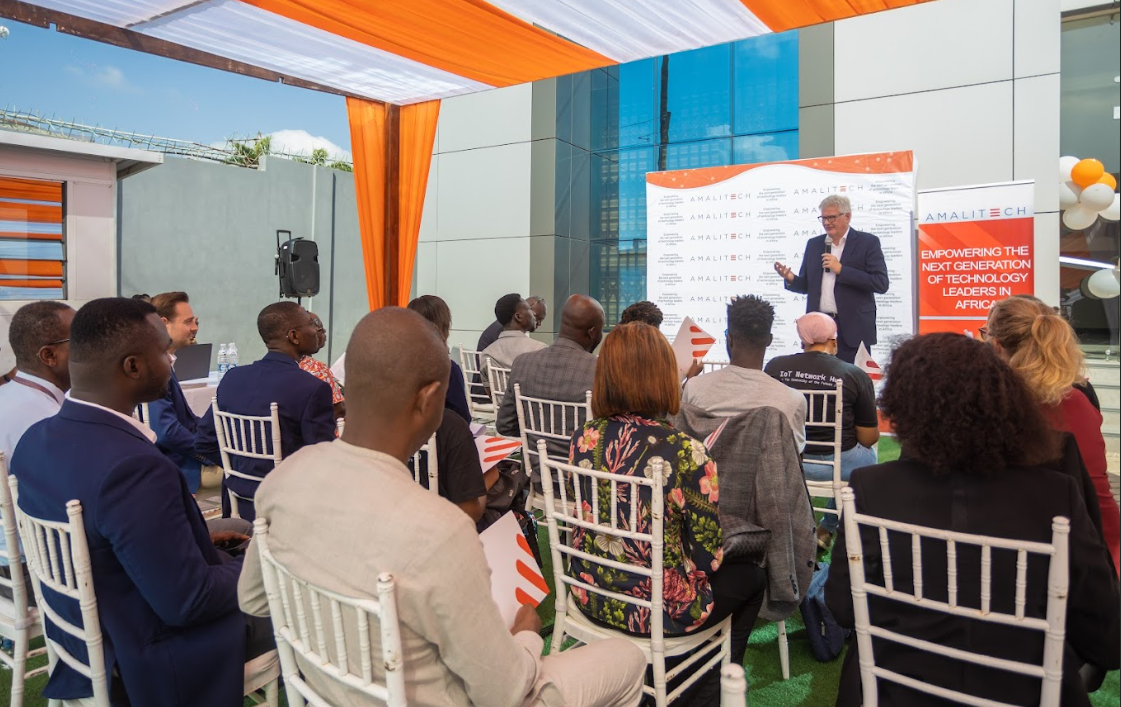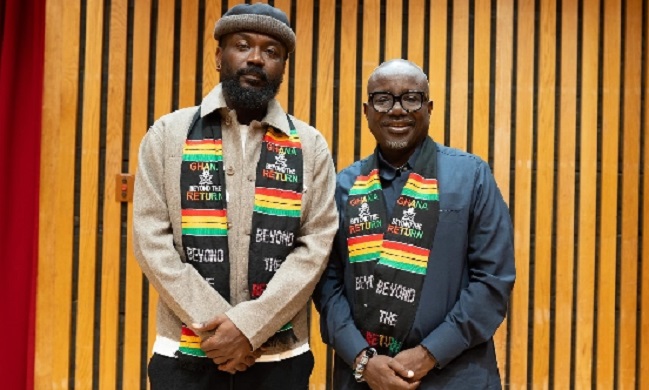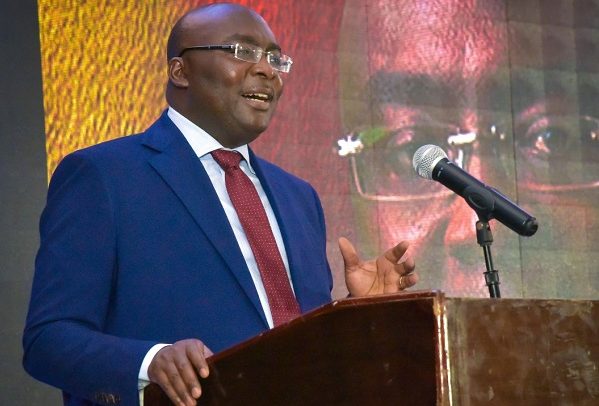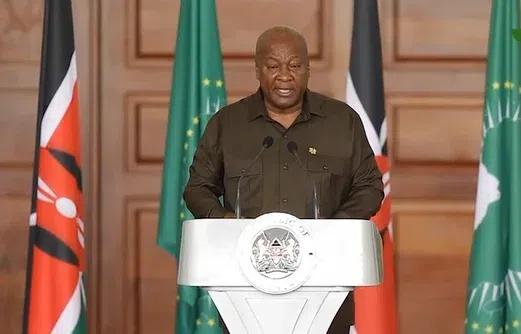
Former Vice President, Dr. Mahamudu Bawumia, wowed students of the Harvard University, in the United States, when he delivered a powerful lecture on the progress of Ghana’s digitalisation journey.
Speaking at Harvard University on Saturday, as keynote speaker on the theme, “Africa Beyond Borders: A Myth or a Mandate for Africa’s Progress,” Dr. Bawumia took the students through Ghana’s globally acclaimed digitalisation initiatives, and the positive impacts they are having towards the transformation of the economy.
Dr. Bawumia first recalled how Africa missed out on the first, second and third industrial revolutions respectively, before declaring the 4th Industrial Revolution indispensable for African countries, if their economies are to be transformed in the 21st century, for meaningful impacts.
“Policy makers in Africa must act with a mindset of possibilities. We should embrace technology and not be intimidated by it. We must believe that we can leapfrog the advanced nations in many areas if we put our minds to it,” Dr. Bawumia said, as he proudly referenced how Ghana’s embrace of digitalisation, which the former Vice President has played instrumental role in, is helping to address age-old challenges, which are inimical to modern economic growth.

“For over 60 years after independence, Ghana had a largely informal system without many of the basic elements necessary for a modern economic system. Today, we are building a formal, systems- and a data-based economy, to compete in the Fourth Industrial Revolution,” Dr. Bawumia said.
“Our challenge is to use digitalization to solve current problems while laying the foundation for the future of jobs, leapfrogging from the second to the fourth industrial revolution. There is mounting empirical evidence that highlights the transformative potential of digital innovation to create jobs, boost productivity, increase income levels, and foster wealth creation,” Dr. Bawumia said.
GHANA’S DIGITAL SUCCESS STORY
The former Vice President said, Ghana, in the last eight years, has embarked on an ”aggressive policy of digitalization’ to ”jumpstart the economic transformation of our country.”
“Focus was on digital technology that can solve our problems. At this stage of our development, we are not looking to have driverless cars or humanoids for example. We want technology that can solve our problems in agriculture, health, education, access to credit, payment system efficiency, public service delivery, revenue mobilization, and so on. Our system had major shortcomings and presented challenges for the digitalization of the economy,”” he said.
Dr. Bawumia noted that, before the start of Ghana’s aggressive digitalisation in the past eight years, it was largely seen as a peripheral concern and not central to the country’s national development agenda.

“My focus on digitalization as Vice-President was the subject of ridicule by political opponents. But I stuck to my vision and set out to use digitalization to solve the everyday problems faced by Ghanaians and in so doing build an engine for economic growth and job creation,” said the former Vice President said, of his personal role in the progress.
Explaining Ghana’s digital journey in detail, Dr. Bawumia presented how Ghana has been able to, through its commitment to digitalisation, addressed many challenges the country could not overcome.
“The most important challenge for our economy as far as digitalization was concerned was that in Ghana, most people couldn’t be uniquely identified. It was possible to be born, live your entire life, die, and be buried in Ghana without there being any official record that you ever existed.
“Everyday interactions with public services—whether it’s applying for a driver’s license, passport, or any government permit—became difficult. Corruption was so widespread that giving and taking bribes became almost normal.”
“Other significant challenges we faced included: absence of a functional national property address system; A modern economy simply cannot function without a reliable address system.”
For these age-old problems, Dr. Bawumia showed how the issuance of Ghanacard to 85% of adult population, as well as the implementation of the digital address systems, have addressed these challenge of lack of unique national identity and lack of a national property adddress system.

Other challenges Dr. Bawumia said are being addressed through digitalisation in Ghana include, a large informal sector and reliance on cash payments; which he said, has been resolved through mobile money interoperability, thus making Ghana one of the most financially-inclusive countries in the world; fragmented, manual databases, which have been addressed by digitalising public services such as application of passports, drivers licencses, registration of businesses, etc; manual records at health facilities, which have been resolved by digitising health records at government hospitals, as well as as poor access to healthcare delivery in remote areas, which have been addressed through Ghana’s world-renowned medical drone delivery service.
A MAJOR PATHWAY FOR JOB OPPORTUNITIES
Apart from its immense impact on transforming the economy into a modern one, Dr. Bawumia said Ghana’s digital strides have created a pathway for more employment opportunities and boosting businesses, largely, with the help of the functioning digital payments.
“The digital payments infrastructure, along with the digital property address system, is boosting e-commerce in Ghana and creating jobs,” he said.
“E-commerce is also booming in Ghana- Many sales are now taking place over Instagram, Facebook, websites etc. Many people who cannot afford to rent or build shops are able to do business on the internet at little cost with deliveries helped by digital address and payments using mobile money interoperability.”
Concluding, Dr. Bawumia reiterated his call to African leaders to embrace digital technology for a brighter tomorrow.
“Let me conclude by saying that the digital economy holds the key to unlocking Africa’s vast potential and creating jobs for the youth. By working together, governments, businesses, educators, and innovators – we can build a future where every African has the opportunity to thrive and contribute to a brighter tomorrow.”
The post Bawumia touts impact of Ghana’s digital milestones at Harvard University first appeared on 3News.
Read Full Story














![[Video] Heartbroken husband of nurse who burnt to death inconsolable at funeral](https://sportal365images.com/process/smp-images-production/pulse.com.gh/16022025/16d8d3d4-b4c7-49b0-8b05-9608091145c1.jpg)






Facebook
Twitter
Pinterest
Instagram
Google+
YouTube
LinkedIn
RSS